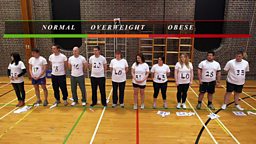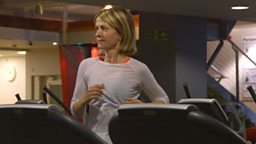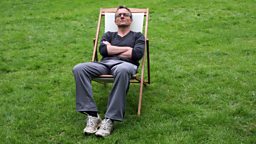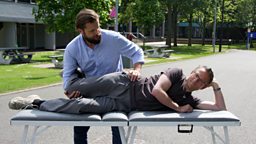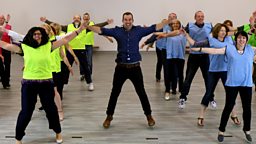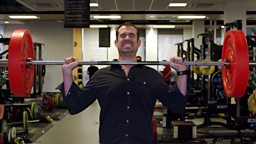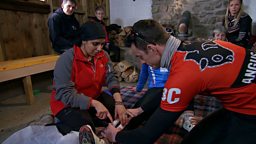Can you get fit simply by doing the housework?

Can you get fit simply by doing the housework?
Dr Chris van Tulleken finds out if household chores could hold the key to fitness.
Doctors recommend that we should get at least 150 minutes of ‘moderate intensity physical activity’ every week to reduce the risk of heart disease, cancer and obesity. But is there a way to reach this target of two and a half hours of exercise simply by doing the chores we have to do anyway?
Dr Chris van Tulleken teamed up with Dr Andy Blannin from the University of Birmingham to find out.
We recruited eight volunteers and asked each of them to wear ‘activity monitors’ whilst they carry out a range of everyday household tasks.
- Ironing
- Dusting
- Mopping
- Vacuuming
- Washing the car
- Cleaning the windows
- Mowing the lawn
- Planting flowers
Results
The data from the monitors allowed us to work out how much physical work the volunteers were doing.
Andy adjusted the data from the activity monitors to account for each volunteer’s age, weight and physical fitness. On average, all except two of the everyday tasks counted as moderate intensity exercise! The graphs below show the results from the indoor, and outdoor activities. Ironing and dusting both scored below 3 METs but all of the others had a score higher than 3 and so count as moderate intensity exercise.
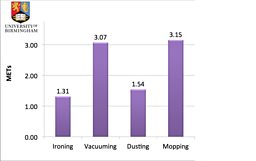
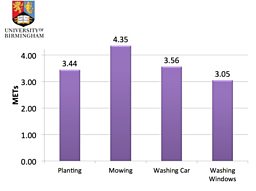
Our volunteers already spend an average of 37 minutes a week vacuuming and mopping and 72 minutes doing outdoor activities. So they’re already doing 109 of their 150 minutes of exercise without going near a gym!
There are tasks that we didn’t test which also count as moderate intensity exercise:
- Walking briskly
- Cycling
- Carrying around a shopping basket instead of using a trolley
However, it’s important to remember that activities scoring less than 3 on the MET scale can still be beneficial. All types of physical activity are beneficial to our health, but we need to do the less intense activities for longer to get similar health benefits.
Andy’s research has also revealed that when you do your exercise can make a difference. Some of the health benefits from moderate activity are transient in nature and last 12-14 hours directly after the activity. So it makes sense to sprinkle the activities throughout the week rather them condensing them all into one big day at the weekend.
Related Links
The Metabolic Equivalent of Task
For each activity we calculated the MET (Metabolic Equivalent) score.
MET values for activities can range from 1 (sitting quietly) to 23 (running at 22.5 km/h – close to 4 min mile pace) - an activity with a MET score of 2 would burn energy at twice the rate of sitting quietly (MET=1).
Activity monitors
The activity monitors we used were small devices worn on the hip which combine tri-axis accelerometers with heart rate data to determine energy expenditure.
Although the little device looks like a pedometer, it is more advanced as it can detect movement in all 3 planes (forwards/backwards, left/right and up/down). Whilst our participants were moving during the various tasks we set them, the monitor was able to calculate the size, speed and frequency of the movements and from this we could calculate energy expenditure.
If an activity didn’t involve much movement of the hips, heart rate data was used to calculate energy expenditure of the activity.
